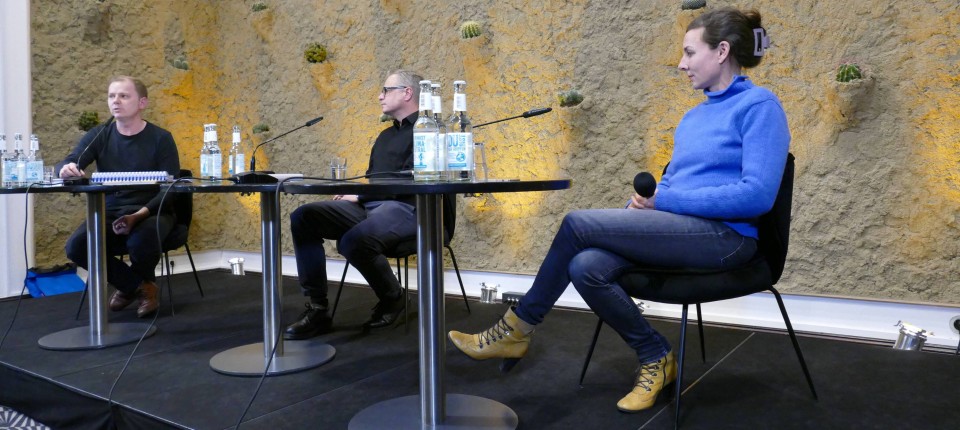Is this Seriousness Sacred?

The Literaturhaus Berlin begins a series of events on the literary commentary on the Basic Law published by Georg M. Oswald. Guest at the start: Oswald himself and Juli Zeh, who is impressive that evening.
He was always quiet about statistics. Generations X to Y paid homage with little respect. Many felt like the little fish that the old fish asked, “How’s the water today?” To which you ask: “What is water?”
As a non-lawyer, you at least know that the German Basic Law should be one of the best constitutions in the world. In 1948/49 his fathers and some of his mothers worked on a complex level of reasoning – which can be seen in the minutes of the Parliamentary Assembly. The wreckage of war was still visible on every street when the catchphrase: “Human dignity is inviolable” was invented.
Decades later, Germans are used to the quiet existence of their businesses like fish in water. Then came the epidemic. And suddenly the fish discovered its element. Some positioned the pandemic emergency as absolute. Others saw civil liberties in jeopardy.
It’s been 75 years since 65 Members of Parliament fought for the German constitution. Good reason for lawyer and author George M. Oswald to commission a “literary commentary” on the Basic Law. The result is a book in which authors such as Julia Frank, Jochen Schmidt and Eva Menas reflect on individual essays. Literaturhaus Berlin opened a series of events around this daring book project on Thursday.
Not only was the editor present, but so were writer and lawyer Julie Zeh and curator Rene Schlott from the Center for Contemporary History Potsdam, who created the series. A specialist in East German history and Holocaust research, he emerged as an outspoken critic of legislative measures taken during the pandemic and has now bridged the gap between artistic expression and political text. This interest aroused so many that the House of Literature sold out.
Where statistics becomes literary
Where is the basic law in terms of morality? From today’s perspective, George M. Oswald found the “sacred seriousness” in the formulations of the Fundamental Rights part admirable. At the same time, a phrase like “human dignity is inviolable” is also problematic, because it leaves room for misunderstandings in interpretation.
Here Julie Zeh was at her best for the first time that night. One can speak of misunderstanding, but also of interpretation, that is, of the process of social negotiation without which there would be no democracy. If she had to dedicate the statute to a genre, of course: “It must always strive to be poetry, not prose.” Because today (also in the constitutional texts) the tendency is clear: the fear of misunderstanding is great, because the law regulates more and more individual cases.
Some of the backlash, now known as the limiting effects of social media discourse, have also hit state institutions. According to their custom, the new craft, which always sees only the individual condition and not the collective one, leads to bad justice, as it is not possible to fully perceive everything that exists.
The drafters of the Basic Law could not have imagined that one day there would be social processes that would restrict freedom of expression in a way comparable to state censorship, which they exclusively thought of when drafting Article 5. What to do? In any case, dare to use more poetry when writing legal texts, and then trust, according to your custom, “that the course of things can also make something out of it.”
Julie Xie described herself as conservative multiple times overnight. When Schlotte interjected that her positions were somewhat liberal, she wittily replied, “Yes, but liberalism has become conservative.” The next edition of this liberal-conservative Basic Law evening will be on February 9th at the Literaturhaus with Daniel Kellmann.

